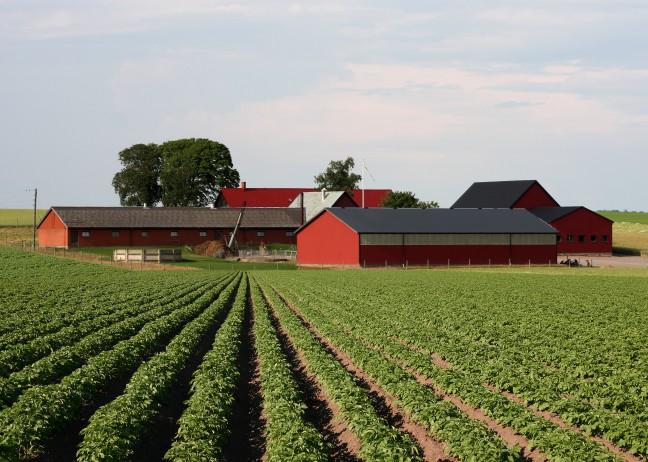Farmworkers who are keeping the grocery stores stocked during the COVID-19 pandemic are at a higher risk for coronavirus infection due to working and living conditions.
Congressional Relations Director of the American Farm Bureau Federation Allison Crittenden said safety remains a top priority across the entire food chain.
“Farmworker safety is [important for] ensuring that American agriculture can continue to do its part of ensuring that we have access to safe, nutritious food as our nation is fighting this global health crisis,” Crittenden said. “We understand that we are in uncharted territory, [but we are] still trying to continue operations and forums to the degree of normalcy as much as we can.”
Johns Hopkins Center for Health Security medical anthropologist Monica Schoch-Spana said farmworkers often have pre-existing conditions such as diabetes or asthma from working in the fields or pesticide exposure, making it more likely they could become ill and have a more severe case of COVID-19.
FB is ensuring that state farm bureaus are aware of different farmworker health resources, Crittenden said, as well as sharing guidelines universities have released with members. Farms themselves have also taken steps to help promote health and safety during the pandemic.
Many farms are using additional personal protective equipment, as well as providing extra sanitary products to their farmworkers, Crittenden said. Additionally, farms are introducing cleaning schedules to ensure common spaces are disinfected frequently.
“If we see farm workers fall ill, that will create some challenges in producing food [which is] why it’s incredibly important to farmers to maintain a healthy workplace, especially now in the era of coronavirus,” Crittenden said.
Schoch-Spana said farmworkers typically work in an arrangement where they do not have insurance or excess money for medical expenditures. Additionally, farmworkers have difficulties getting away from work to acquire permission for doctor visits.
“We have discussed as an organization the importance of making sure that healthcare is available to farmworkers [to] the same degree as it is to anyone else in America,” Crittenden said.
Crittenden also mentioned that many resources and public health options are available to receive healthcare regardless of health insurance.
Because of the farmworkers’ nature of work — close proximity to one another in the fields and dense housing conditions — it is not possible to maintain good physical distance, Schoch-Spana said.
“Because of the crowding, if there is a single sick person in the group, there’s a higher likelihood that they could pass the disease along,” Schoch-Spana said.
A subset of the farmworker population, migrant farmworkers, are facing a different set of challenges. According to the United States Department of Agriculture, the share of hired crop farmworkers who are not legally authorized to work in the United States in 2016 was 50.1%, with 22.0% percent being authorized immigrants.
Migrant rights organization Centre de Los Derechos Del Migrante launched a report claiming migrant workers feel uncomfortable asking their employers for a break when feeling ill or needing water.
Migrant workers feel they might be retaliated against by social systems if they want to take a day off, as their major concern is not having protection under paid sick leave, Centro de los Derechos del Migrante spokesperson María Perales Sanchez said.
Migrant workers do not have access to healthcare, and the few that do have very limited access. According to Schoch-Spana, there have been reports of ICE officials staking out federally qualified health centers to try to pick up any undocumented workers.
“The dangers relative to the disease of being undocumented is trying to fly under the radar and not seeking out care when it would be beneficial,” said Schoch-Spana.
Sanchez said migrant workers should be protected to receive access to benefits to ensure they are able to take time off, particularly when they are ill.
“One thing that we do see for migrant workers is that they depend on their jobs to be able to feed their families, to make it day by day, and so even if they are feeling ill sometimes, it’s difficult for them to make that choice,” Sanchez said.
Immigration and Customs Enforcement announced it will not arrest immigrants at health care facilities during the COVID-19 pandemic. U.S. Citizenship and Immigration Services also announced it will not penalize immigrants for getting testing or treatment for COVID-19 when applying for green cards or visas in the future, even if their care is paid for by a public benefits program.
Recent legislation that provides paid sick leave if the illness is related to coronavirus is a good incentive for employers and employees to make good choices regarding coronavirus, Crittenden said.
“We’ve emphasized to our membership the importance of making sure employees are aware of healthcare options available to them and the importance of staying home,” Crittenden said regarding immigrant farmworkers. “Education and awareness is critical in ensuring the comfort level that they can stay back and take care of their health right now.”
FB is advocating to develop ways to offset costs farmers are incurring associated with coronavirus mitigation, such as sanitizing equipment, obtaining PPE and potentially securing additional housing, according to Crittenden. FB hopes offsetting the costs will allow farmers to make these resources more readily available.
Schoch-Spana expressed the need for fundamental structural changes, including requiring better housing situations, reforms relative to employers and wage levels and improving immigration policies.
“The lower-income workforces keep our communities functioning and getting food from the field into the grocery stores is absolutely essential,” Schoch-Spana said. “They are essential workers, and yet they are devalued and their health suffers for it.”


